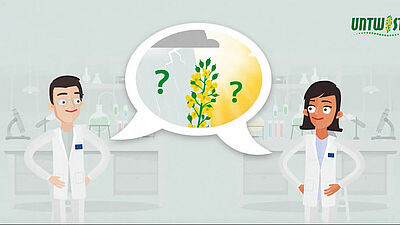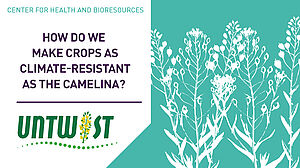The native oil crop camelina (gold of pleasure) is remarkably resilient to heat and drought; traits that are more important today than ever before. In the H2020 project UNTWIST, AIT expert Claudia Jonak (Center for Health and Bioresources) is exploring the plant's secret to learn from it and thus support European agriculture in meeting the challenges of climate change.
The current drought in large parts of Europe is particularly affecting agricultural crops, which are often optimized through breeding for yield under optimal conditions and have little to counter the ongoing heat and drought. Hope lies in the native, traditional crop plant gold of pleasure (Camelina sativa). Not only is it rich in omega-3 fatty acids, but has also a naturally high tolerance to heat and drought. The Horizon 2020 project UNTWIST is funded by the European Union with nearly EUR 5 million for five years to learn from this ancient oil plant, which has undergone little breeding, how successful adaptation to drought and heat is possible for other crops as well. Claudia Jonak, UNTWIST project coordinator (AIT Competence Unit Bioresources of the Center for Health & Bioresources) explains: "On the one hand, our goal is to make camelina better known and to exploit its potential; on the other hand, we want to use the adaptation mechanisms of camelina to make other crops fit for the challenges of climate change and to ensure their yield also under adverse environmental conditions." AIT is working closely with seven other European project partners: Institut National de Recherche pour l'Agriculture, l'Alimentation et l'Environnement (INRAe), Rothamsted Research Limited (RRes), Forschungszentrum Jülich GmbH (FZJ), University of Bologna (UNIBO), Camelina Company Espana S.L. (CCE), Iniciativas Innovadoras SAL (INI), RTDS - Association for the Promotion of Communication and Outreach of Research, Technology and Innovation.
After a thorough evaluation phase, the four most promising camelina lines were selected from more than 50 different lines, which will now have to prove themselves under controlled stress conditions in the glasshouse as well as in the open field. The (epi)-genomes, metabolic responses, cell physiology and gene and protein expression to heat and drought will be analyzed and correlated with agronomic parameters such as yield and crop quality. The goal is to develop new molecular and metabolic markers for breeding stress-tolerant crops, as well as complex computer models that can predict crop adaptability. These data and models will be made available in a web-based "Plant Adaptation Hub" database.
This project was funded by the European Union's Horizon 2020 research and innovation program under grant agreement No. 862524.
Detailed information in the press release (DE):
https://www.ots.at/presseaussendung/OTS_20220822_OTS0029/wie-machen-wir-pflanzen-so-klimaresistent-wie-den-leindotter
Link project: https://www.untwist.eu/
Link project video: https://www.youtube.com/watch?v=PEABitDXXng




